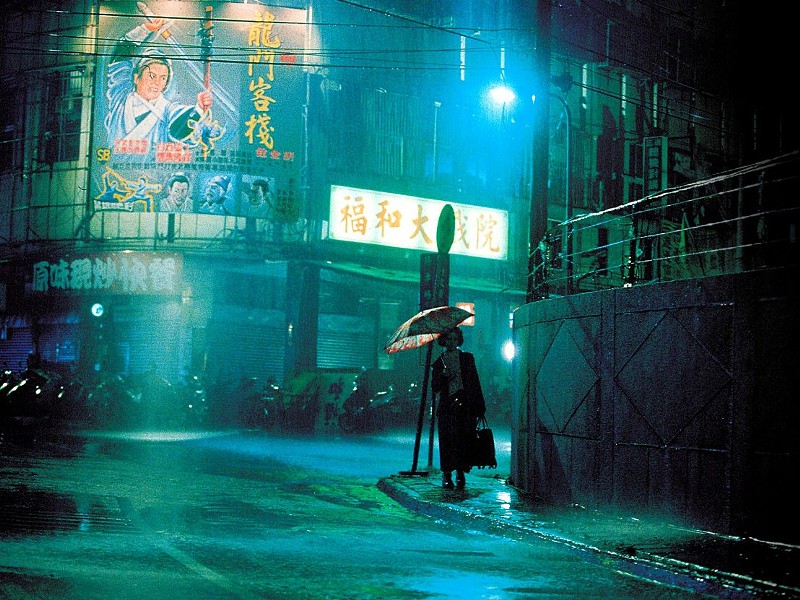Movies need not be “about” much in terms of plot, for they have plenty of other options. An orientation toward containing, addressing, or expressing something provides, if anything, an array of richer modes — and Tsai Ming-liang’s elegiac 2003 film Goodbye, Dragon Inn is only better for doing all three. Largely discarding plot in favoring a procession of finely evoked resonances with histories political, aesthetic, and personal, all flowing through a shared experience of a memorialized work of art, Goodbye makes much of seemingly little by attuning itself to loss.
Containing its action (such as it is) within a final screening at Taipei’s single-screen theater the Fu-Ho Grand, Goodbye, Dragon Inn rides along twin narrative spines within that space. First: the film-projected unfolding of Dragon Inn itself: King Hu’s dazzling martial arts film of 1967, and his first film to be shot on his own terms in Taiwan, which plays out its running time in the background of the film. Second: a theater supervisor (Chen Shiang-chyi) navigating the darkened theater to deliver a pink steamed bun to the film’s projectionist (Lee Kang-sheng, a consistent muse for Tsai) as a small, shy gesture of affection. As the film moves along these two tracks, the space they take place in and the continuity of the culture grown within it are gradually revealed.
The Fu-Ho’s largely empty structure is, as with so many spaces in Tsai’s work, porous. Littered with buckets collecting rainwater which laps up also past the threshold of the lobby’s open door, Goodbye establishes the theater as a fragile ecosystem: a part, ultimately, of its draw for us and attendees. For viewers coming to gaze upon the film, either nostalgically or anew, the dilapidated, undervalued space and old print furnish watching with a unique resonance — one heightened by the reappearance in the theater of audience members Miao Tien and Chen Chao-jung, also two of Dragon Inn’s aging stars. But the theater attracts a more apathetic or at least distracted population, too: a small troupe of gay men furtively cruising in the chambers of the cavernous space. Shuffling around seats, stalls, and urinals with the film offering little more than an excuse for their hoped-for encounters, their abashed inattention grants their skulking a desultory air, and a sense of faint embarrassment. But the way it’s presented, with a sense evoked of not-belonging (“ghosts” are alluded to more than once), the comedy of their efforts proves more deeply touching (Tsai, it’s worth noting, is queer). Like those raptly watching the screen, they’re trying to reach out to something past themselves.
Much of what Goodbye addresses is accessed like this: found by reaching both past oneself and beyond apparent surfaces. While the Fu-Ho may seem shabby at a glance, its fragility as an ailing brutalist structure conveys a certain kind of beauty, and the experiences found within it are singular and irreplicable. Its flickering lights, its dingy bathrooms, its projection booth, and dripping hallways provide a portal into something else. Whether its attendees seek something erotic or emotional, physical, or more nostalgic, an openness to experience — to both ecstasies and disappointments — is not just cultivated but required.
Thanks to Tsai’s distinct humor and practice in treating romantic longing, his film avoids the drag of maudlin tendencies. With Pen-Jung Liao as Goodbye’s cinematographer, Tsai’s created a superficially abstract work rooted in concrete, intimate detail: one with encounters that range from near-slapstick to more tender glimpses of romantic disappointment, all treated with a sure and steady gaze. Thanks to its makers’ grasp of place and texture, the Fu-Ho’s granted the sensation of an oddly lively graveyard even before it’s closed and gone. Its lonely, shadowed walkways and unrequited gestures — as much as the way Dragon Inn’s soundtrack, a dispatch from a distant past – linger in lengthy shots within it offer signs of an artist who understands the roots of feeling and experience in such peculiar unions of place and moment. Rooted in a single urban edifice (just as Dragon Inn’s anchored by a rural outpost), Goodbye’s twilit setting imbues its action with a sense of climactic scarcity; whatever one makes of the Fu-Ho’s diverse and fractured culture, its closure ensures that it can never be as we find it in watching again — and one can value that or not.
Goodbye’s sense of precarity, though, nods to matters larger than the space that roots it. With the original Dragon Inn’s aesthetic freedom tied to its independent production in Taiwan, its living on in the space, at least for a time, reflects more uncertainly upon Taiwan’s overshadowed place in the world than it does the more certain prospect of its cinema’s decline. Gesturing likewise in one of the film’s few live-recorded lines of dialogue (“No one comes to the movies anymore,” one of Dragon Inn’s old stars mourns), Tsai’s film demonstrates better than most what’s contained in the full range of experiences found in watching and the spread of what they can touch. But it’s done, crucially, through a distinct and expressive vision: one that doesn’t treat the value of cinema as a space or form as any kind of default. In treasuring what’s fragile, even disappointing and unglamorous, the film conjures an uneasy and an unblinkered sense of romance driven by a grasp of what keeps cultures, places, and memories alive. In conveying the ease with which a film can play to no one, passing its longed-for audiences by, Goodbye withholds easy comforts while providing one that counts.
Goodbye, Dragon Inn will be screened at 7:30 p.m. on Wednesday, March 23 via Cinema Lamont at the Oloman Cafe; 10215 Joseph Campau Ave., Hamtramck; cinemalamont.com. Tickets are $20.
Stay connected with Detroit Metro Times. Subscribe to our newsletters, and follow us on Google News, Apple News, Twitter, Facebook, Instagram, Reddit, or TikTok.


